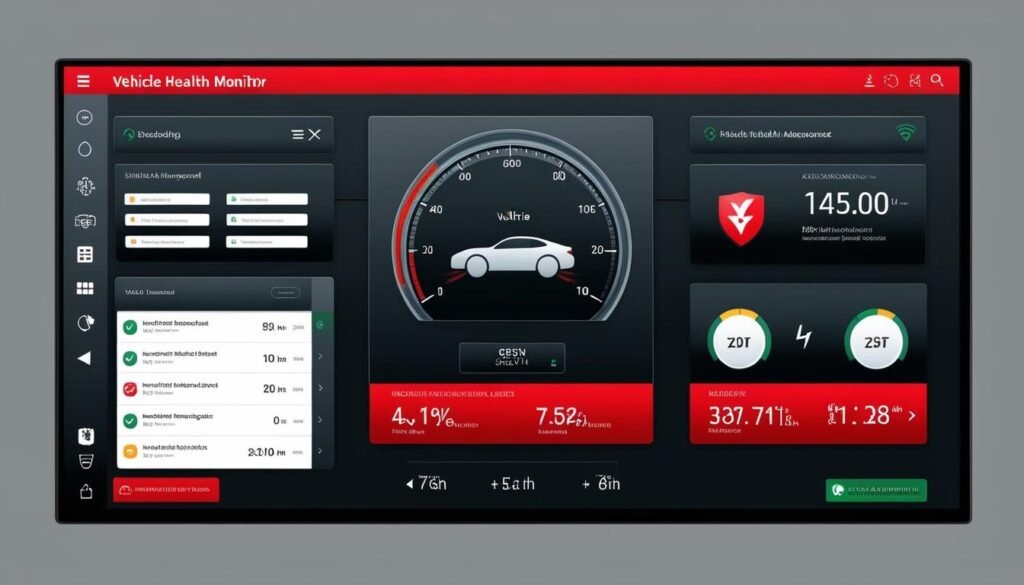Madison Heights-based Guidepoint Systems introduces the Vehicle Health Monitor and Dealer Command Center to boost profitability and enhance fleet management for automotive dealerships.
Guidepoint Systems, based in Madison Heights, has unveiled significant technological innovations aimed at enhancing profitability and fleet management in the automotive dealership sector. The company is introducing two new offerings: the Vehicle Health Monitor (VHM) and the Dealer Command Center (DCC).
The Vehicle Health Monitor (VHM) is designed to provide continuous oversight of vehicle systems and mileage, thereby alerting owners to scheduled maintenance requirements and potential repairs. According to a statement from the company, “Our latest innovation is an all-new VHM platform, designed to help dealers grow service revenues and increase customer satisfaction, loyalty, retention, and referrals.”
Key features of the VHM include real-time diagnostic trouble code (DTC) monitoring, automated diagnostics, scheduled maintenance reminders, and recall notifications. Additionally, it facilitates customers in scheduling their service visits. The company asserts that this solution not only serves as a tactical instrument but also acts as a strategic asset for dealerships to elevate revenue streams and enhance customer satisfaction by ensuring vehicles operate at optimal performance.
Guidepoint highlights several anticipated benefits for dealerships adopting the VHM. These include a reduced earnings curve by leveraging accurate odometer readings, minimising defection points, increased service revenues through consistent customer visits, improved inventory management, and enhanced customer loyalty and referrals. The system is built to integrate seamlessly with existing hardware and applications.
In conjunction with the VHM, Guidepoint is introducing its Dealer Command Center. This service is tailored for dealerships seeking enhanced convenience in remote inventory management. The DCC will assist dealers in monitoring incomplete registrations, device status, fuel levels, battery alerts, and vehicle reporting, among other critical metrics. Guidepoint positions the DCC to serve dealer groups and dealerships with multiple locations, especially those interested in outsourcing non-core business operations.
Meanwhile, the automotive industry continues to embrace artificial intelligence (AI) to enhance customer experience and operational efficiency. Nick Latino, the fixed operations director at Parkway Toyota, has shared insights into the implementation of AI within his dealership during a recent episode of Inside Automotive. His store is currently piloting DGA’s Alpha Drive AI programme, which has produced notable outcomes, particularly in reducing missed appointments, a frequent challenge in service departments.
Latino explained that the AI’s human-like interactions have been instrumental in capturing missed calls and streamlining appointment scheduling, thus alleviating the workload on staff who can now concentrate on more significant tasks. The AI system also possesses the ability to transfer customers to live agents when necessary, ensuring a seamless customer experience.
Beyond the scheduling aspects, the Alpha Drive AI programme has enhanced outbound follow-up calls concerning accounts with no-repair orders. The AI’s integration with the dealership’s DMS permits it to autonomously access customer data and complete follow-up tasks, thus minimising the risk of missed opportunities.
Latino expressed some concerns regarding AI’s potential impact on traditional business development centre (BDC) roles, suggesting that the increased reliance on AI may reduce the demand for human attendants. Despite this, he acknowledged the considerable advantages that AI brings to service operations, which includes autonomously issuing status updates to clients, therefore filling in gaps when service advisors may overlook follow-ups.
Looking ahead, Latino aims to extend AI’s capabilities at Parkway Toyota by incorporating communication management via text messages and emails for declined services. He asserted the importance of consistent engagement with customers, remarking, “We’re leaving money on the table by not following up with customers, and AI helps fill that void.”
As businesses across the automotive industry increasingly integrate AI and automated solutions into their operations, they are likely to witness significant enhancements in customer service, operational efficiencies, and revenue generation.
Source: Noah Wire Services
- https://www.guidepointsystems.com/guidepoint-dealerware-team-up-to-help-automotive-dealerships-reduce-costs-improve-csi/ – Corroborates the integration of Guidepoint Systems with other technologies to enhance fleet management and customer service in automotive dealerships.
- https://www.guidepointsystems.com/stellantis/ – Supports the features of Guidepoint’s fleet management systems, including vehicle health monitoring, diagnostic trouble codes, and predictive maintenance.
- https://www.prnewswire.com/news-releases/cerebrumx-and-guidepoint-systems-join-forces-to-leverage-embedded-vehicle-data-for-fleets-and-dealership-lot-management-301981679.html – Details the partnership between Guidepoint Systems and CerebrumX to leverage embedded vehicle data for fleet and dealership lot management, aligning with the Vehicle Health Monitor and Dealer Command Center functionalities.
- https://www.guidepointsystems.com/guidepoint-dealerware-team-up-to-help-automotive-dealerships-reduce-costs-improve-csi/ – Explains how Guidepoint’s solutions integrate with existing hardware and applications, and the benefits of real-time monitoring and automated diagnostics.
- https://www.guidepointsystems.com/stellantis/ – Provides insights into Guidepoint’s capabilities in monitoring vehicle health, battery levels, and other critical data, which are key features of the Vehicle Health Monitor.
- https://www.prnewswire.com/news-releases/cerebrumx-and-guidepoint-systems-join-forces-to-leverage-embedded-vehicle-data-for-fleets-and-dealership-lot-management-301981679.html – Highlights the elimination of dependency on external hardware and the use of embedded data for real-time monitoring, which is relevant to the Dealer Command Center’s remote inventory management capabilities.
- https://www.guidepointsystems.com/guidepoint-dealerware-team-up-to-help-automotive-dealerships-reduce-costs-improve-csi/ – Describes how Guidepoint’s solutions help in reducing costs, improving customer satisfaction, and enhancing fleet management, aligning with the benefits of the Vehicle Health Monitor and Dealer Command Center.
- https://www.guidepointsystems.com/stellantis/ – Details the use of AI and sensors in Guidepoint’s fleet management solutions, which is relevant to the integration of AI in enhancing customer experience and operational efficiency.
- https://www.prnewswire.com/news-releases/cerebrumx-and-guidepoint-systems-join-forces-to-leverage-embedded-vehicle-data-for-fleets-and-dealership-lot-management-301981679.html – Explains how the integration of AI and embedded data enhances operational efficiency and customer satisfaction, similar to the benefits mentioned for the Alpha Drive AI programme.
- https://www.guidepointsystems.com/stellantis/ – Supports the use of AI in automating tasks such as driver safety scorecards, accident reconstruction, and real-time alerts, which are similar to the AI functionalities described in the Alpha Drive AI programme.
- https://www.prnewswire.com/news-releases/cerebrumx-and-guidepoint-systems-join-forces-to-leverage-embedded-vehicle-data-for-fleets-and-dealership-lot-management-301981679.html – Corroborates the importance of consistent customer engagement and follow-up, which is a key aspect of the AI-driven solutions discussed in the article.
- https://news.google.com/rss/articles/CBMi0AFBVV95cUxNTUJicnh5RGxlWFR2VUJ4QlpMRW10SEY0R2tOVHB1OGpFV3g4UlMta1A4VDE5Nkl5ZmtYbHF0aGYxWEJzTDZ4d2JWMktnbG5aQkZSQVBULWRud2lmQVRoMGJzb2V1QVpvVlpuNnlVQlQxajA0TmNBd0JrREdLZmhpRlBfTUwxU3V4UmROVDc0T3hzWVY3c09Zd25FdnM4aElld0pTZmtyZC1rcjlTaGx6R2lXWHpoaEYwelRaNHd2M1VTdHl2LTNxQVFWU3pDVFRn?oc=5&hl=en-US&gl=US&ceid=US:en – Please view link – unable to able to access data


